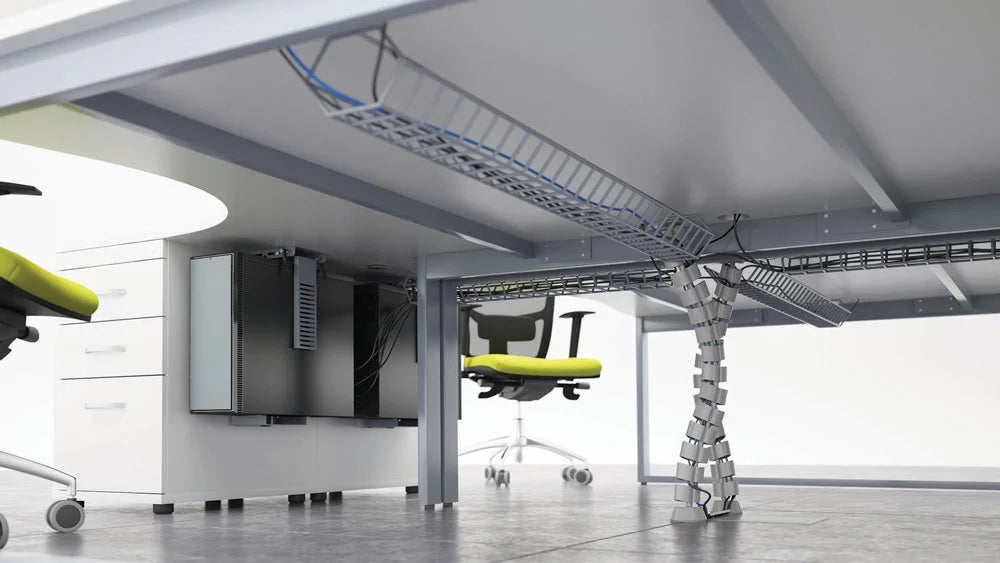Menu
-
-
Shop By
- Our Projects
- Office Design
- Trade Clients
- Space Planning
- Contact Us

Cable management refers to the process of organising, arranging, and securing cables and wires in a neat and orderly manner. This involves using tools and techniques to minimise cable clutter, prevent damage to cables and equipment, and improve the overall safety and efficiency of a workspace or environment. Cable management can involve organising cables for computers, home entertainment systems, data centres, offices, and other settings where multiple devices and wires are used. Effective cable management can help to improve cable reliability, reduce maintenance and repair costs, and enhance the aesthetics of a workspace.
There are several types of cable management equipment available, including:
Cable management is important for a number of reasons. Firstly, it enhances safety by reducing the risk of accidents and injuries caused by loose cables. Secondly, it improves efficiency by making it easier to access and maintain cables, reducing downtime and increasing productivity. Thirdly, it enhances aesthetics by creating a more organised and professional-looking workspace. Fourthly, it protects equipment by ensuring that cables are properly secured and not at risk of damage or disconnection. Finally, proper cable management can ensure compliance with industry-specific or regulatory standards. Overall, cable management is an essential aspect of workspace organisation that contributes to a safer, more efficient, and productive work environment.
Effective cable management offers several benefits that contribute to a safe, efficient, and organised workspace. It reduces the risk of accidents and tripping hazards caused by loose cables, and makes it easier to locate and maintain cables, thereby increasing productivity and reducing downtime. Proper cable management also improves the aesthetic appeal of the environment, and protects equipment from damage caused by improperly secured or tangled cables. Additionally, certain industries require specific cable management practices to comply with safety or regulatory standards. Overall, cable management is an important aspect of workspace organisation that enhances safety, efficiency, and productivity while minimising risks.
Firstly, it's important to plan ahead and determine the most efficient cable routes, based on the location of devices and power sources. Secondly, using labels or colour-coding cables can help identify specific cables and simplify troubleshooting. Thirdly, grouping cables based on function or location can help keep them organised and minimise clutter. Fourthly, using cable ties or cable sleeves can help keep cables tidy and secure. Lastly, regularly inspecting and maintaining cables can prevent damage and prolong their lifespan. By following these tips, beginners can effectively manage their cables, enhance safety and organisation, and improve the aesthetics of their workspace.
There are several common cable management mistakes that people should avoid. Firstly, leaving cables unsecured can create tripping hazards and cause damage to equipment. Secondly, failing to label cables can make it difficult to identify them, leading to confusion and potential errors. Thirdly, using inadequate or mismatched cables can result in performance issues or even equipment damage. Fourthly, failing to plan ahead and consider the future growth of a system can result in overcrowding and difficulties when adding new equipment. Lastly, not inspecting cables regularly can lead to damage or malfunctions that can be costly to repair or replace. By avoiding these mistakes, people can effectively manage their cables, enhance safety, and improve the overall efficiency and performance of their system.
When choosing a cable management solution, several factors should be considered. Firstly, the type and quantity of cables to be managed should be assessed to determine the most suitable solution. Secondly, the location and environment where the cables will be used should be taken into account to ensure the solution can withstand any relevant hazards such as temperature, moisture or vibration. Thirdly, the level of accessibility required for the cables should be evaluated to determine whether a more flexible or rigid solution is appropriate. Fourthly, the aesthetics of the solution should be considered to ensure it complements the overall appearance of the workspace. Finally, the budget and resources available should be taken into account to ensure the solution is cost-effective and feasible. By considering these factors, individuals can select the most appropriate cable management solution to meet their specific needs.
Of course, the perfect setup can be different for each individual due to variables including location of your power source, type of desk etc. At Radius Office, we would recommend the following set up as illustrated below:

We would recommend each workstation to be set up with an in-desk power module such as the Punto modules on our website. The cables for this unit can feed through a recommended cable basket or tray under the desk. A PDU unit can be fitted here with power supply for computers and monitors. The cables leading out of the cable tray can be safely distributed to a power source within a floor box using a cable spine. This would be the recommended setup we would encourage for all workstations.
Most standard cable management equipment can be incorporated into sit-stand or height adjustable desks. It is important to make sure you use extra long cable sleeves or spines so that they will reach from the floor to the desktop at full height. This also applies to your mains power lead if feeding from a floor box electrical unit to your desk. Some ranges such as our Levo range of height adjustable desks come with cable management built into the frame.
Do you have a fit out project to discuss?
Please get in touch with us.